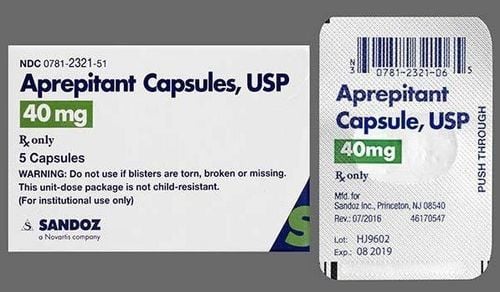This is an automatically translated article.
The treatment of cancer with chemotherapy can cause many unwanted effects, including vomiting. At this point, Cinvanti may be included in your regimen to help prevent nausea and vomiting.
1. What does Cinvanti do?
Cinvanti is an intravenous emulsion, containing the main ingredient Aprepitant, belonging to the class of NK1 receptor antagonists (Neurokinin-1 Receptor Antagonist).
Cinvanti injection is used with other medicines (eg, Dexamethasone, Granisetron, Ondansetron) to prevent acute, delayed nausea and vomiting caused by chemotherapy drugs.
The drug is a P/neurokinin 1 (NK1) receptor antagonist that works by blocking signals to the brain that cause nausea/vomiting.
2. How to use Cinvanti?
2.1. Contraindications to the drug Cinvanti Contraindicated in the following subjects:
Do not use Cinvanti for people who are allergic to any ingredient of the drug. With caution in the following cases:
Elderly patients are more likely to have heart, liver, and kidney problems, so caution should be exercised when using and adjusting the dose of the drug. The risk of using this drug during lactation has not been established, so it should be used with caution in this population. The use of this medicine in people with severe liver disease may be because it makes the condition worse. 2.2. Using Cinvanti correctly Medical professionals will give this medicine in a medical facility through a needle that is placed in one of your veins. This medication may be given by injection over as little as 2 minutes or may be given by slow infusion over at least 30 minutes. Cinvanti will be given on the first day of chemotherapy along with other medicines (eg, Dexamethasone, Ondansetron, Granisetron) about 30 minutes before starting treatment. 2.3. Precautions while using Cinvanti Tell your doctor if you still have nausea and vomiting after leaving the medical facility.
Do not inject this medicine if you are also taking Pimozide. Concomitant use of these drugs can cause serious side effects.
Hormonal birth control pills (eg, pills, rings, other devices) may lose their effectiveness in preventing pregnancy when taken with this medicine. Try another form of birth control (including a condom or spermicide) along with the pill during treatment with Cinvanti and 1 month after the last dose. If you think you have become pregnant while using this medicine, tell your doctor right away.
A serious allergic reaction, called anaphylaxis, can occur with this medicine and be life-threatening, in which case you need emergency medical attention. Tell your doctor if you develop signs of itching, rash, hoarseness, trouble breathing/swallowing or any swelling in your hands, face or mouth after taking this medicine.
Cinvanti may decrease prothrombin time (the time it takes for blood to clot) when used with Warfarin in patients with blood clotting problems.
3. Drug Interactions of Cinvanti
Use of Cinvanti with any of the drugs listed below is not recommended:
Eliglustat; Flibanserin; Lomitapide; Pimozide; Carbamazepine ; Clarithromycin; Codeine; Colchicine; Domperidone; Erythromycin; Estradiol; Etonogestrel; Hydrocodone; Ketoconazole ; Lopinavir; Lorlatinib; Mitotane; Norgestrel; Olaparib; Oxycodone; Phenytoin ; Rifampin; Ritonavir; Saquinavir; Tacrolimus ; Amlodipine; Dexamethasone; Methylprednisolone; Midazolam; Quetiapine; Sirolimus; Suvorexant; Warfarin. Using Cinvanti with any of the medicines below may increase your risk of some side effects, but taking both medicines may be the best treatment. So when prescribing them together, your doctor may change the dose or frequency of using them.
4. What are the side effects of Cinvanti?
In addition to the necessary effects, Cinvanti may cause some unwanted effects. Tell your doctor right away if any of the following side effects occur:
Bloody, black or tarry stools; Burning sensation when urinating; Chest pain or discomfort; Chills ; A cough; Defects in intelligence, memory, attention, learning ability; Difficult or painful urination; Fast, irregular, or irregular heartbeat or pulse; Fever; Frequent urination; Heartburn; Skin is more sensitive to the sun; Undigested; lightheadedness, dizziness, or fainting; Lower back pain or pain on one side; pale skin; Skin discoloration; Severe and persistent nausea; severe abdominal pain, cramps, burning; slow heart rate; Sore throat; Lots of swelling; Shortness of breath, shortness of breath on exertion; Sores or white spots in the mouth; Unusual bleeding or bruising; Drowsiness, fatigue, lethargy, weakness; Vomiting of substance that looks like coffee grounds; blistering/flaking skin; Diarrhea; Difficulty swallowing; skin rash, itching; Joint or muscle pain; Swelling of eyelids, around eyes, face, tongue, lips; Red, irritated eyes; Chest tightness. Cinvanti is a prescription drug, used in medical facilities under the supervision of medical staff, so you just need to adhere to the treatment, let your doctor know about the condition during and after taking the drug for advice. most reasonable.













